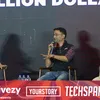Techsparks 2019: FabIndia Chairman William Bissell reveals how he built India’s largest private platform for traditional products
In a conversation with YourStory Founder and CEO Shradha Sharma at TechSparks 2019, the FabIndia mastermind explained how he created a business that links over 55,000 craft-based rural producers to modern urban markets.

When William Bissell, Chairman of FabIndia, was a child, all his friends wanted to become pilots. But William wanted to own the airline. He didn’t come from a business family, but they told him he had an entrepreneurial mindset.
Although his father, John Bissell, started the textile export business in 1960 that would eventually become FabIndia, William took over the reins when his father fell ill.
William told Shradha Sharma, Founder and CEO, YourStory, at Techsparks 2019, “I originally wanted to be an environmental journalist. But after my father fell ill, I chose to continue with his export business even though I wasn’t interested in it before.”
The export business sold under other brand names, but William decided to pivot to retail and establish a brand the business would sell under.
FabIndia’s genesis was also a consequence of his desire to create an Indian brand that revived the country’s heritage in some way. William thus began retailing garments handmade by rural craftspeople from across the country.
“I grew up travelling across India and was exposed to the range of products made in villages and rural areas. My early training had already started then. I was exposed to this so much that I carried these thoughts even as I grew up,” he said.
From accidental entrepreneur to Chairman at FabIndia
Often called the accidental entrepreneur, William didn’t come from a business family; he says his father also started a textile business at a late stage and that too by accident.
“During my initial days at FabIndia, other business people came from families who had networks to draw money from. I didn’t have these networks. So, I formed my own council of advisors, and in exchange for their valuable advice, gave them some equity in the company,” he said.
Until 2018, William served as the Managing Director of FabIndia. Now as the Chairman, he has transformed the brand into the nation’s largest private platform for handmade products inspired by traditional techniques and skills.
The company claims its products are currently produced by over 40,000 artisans and craftspeople across India.
It also says it links over 55,000 craft-based rural producers to modern urban markets, creating a base for skilled, sustainable rural employment. Another objective of the company has been preserving India's traditional handicrafts.
Staying relevant over the years
William explained that he has had to constantly look at reinventing FabIndia as the consumer market evolved rapidly. When the ecommerce boom happened, FabIndia’s investors said the brand needed to pivot to ecommerce, but William stood his ground.
“Some investors said we should go the ecommerce way or die. I said, ‘I choose neither’. I didn’t want to lose the kind of money ecommerce businesses were losing. Further, none of our core competencies lent us to becoming an ecommerce company,” he added.
Staying true to William’s vision of selling offline, FabIndia opened over 250 physical outlets.
“Consumers still want the human-to-human experience of buying from a physical store. And we wanted to master this space and create India’s favourite experience of buying fabrics,” he said.
The experience of buying at FabIndia is also changing with its focus on wellness products.
“I always kept a curious mind. Once I spoke to all the passengers in a train compartment. I saw they all had wellness on their minds, and that inspired me to venture into organic wellness products,” William said.
According to William, new ideas come from the ecosystem, and if people don’t listen to the ecosystem, they shut themselves off from ideas.
The secret to scaling up
FabIndia’s successful scaling up story stems from William’s firm belief in something he calls “franchise energy”.
He explained, “Entrepreneurs have a ‘get up and go’ and inspirational type of energy. However, the energy that builds large companies is an institutional energy. Franchise energy is different from the energy that creates ideas. It is about ratios, details, efficient systems, checklists, rolling new things out, incremental improvements, etc.”
But even with a focus on “franchise energy”, scaling up can be challenging without external investors. The FabIndia Chairman believes that going into a fund-raising round is like marriage.
“Sometimes, investments happen based solely on the valuation of the company. One has to spend a lot of time with investors before raising funding. If long-term interests are not aligned, there will be constant friction. Founders need to respect what investors bring to the table,” William noted.
Learnings from a rich entrepreneurial journey
William didn’t go to any business school and doesn’t have a fancy MBA degree. But he admitted he was initially in awe of people with MBAs who told him how FabIndia should scale up.
“I listened to some of them and made the biggest mistake of my life by acquiring a UK brand. I spent 10 years digging myself out of the hole. I didn’t have the fancy degree but I had a dukandaar’s attitude to business. I then realised I shouldn’t be in awe of those people,” he said.
William also said raising funds is not a strategy or a business. “For me, business is about connecting with your passion and what you believe in. Business shouldn’t be done just because of investments. So, it’s important to know who you are and who you are not,” he said, adding, “It’s important to say no to a lot of things so you have more time and energy to say yes to the crucial things.”
(Edited by Evelyn Ratnakumar)
YourStory's annual extravaganza TechSparks brings together the best and the brightest from the startup ecosystem, corporate world, policymakers and, of course, the investor community. Over the past decade, TechSparks has grown to become India's most loved tech and startup platform for knowledge sharing and networking. A big thank you for all your support over the years and a big shoutout to our sponsors.










